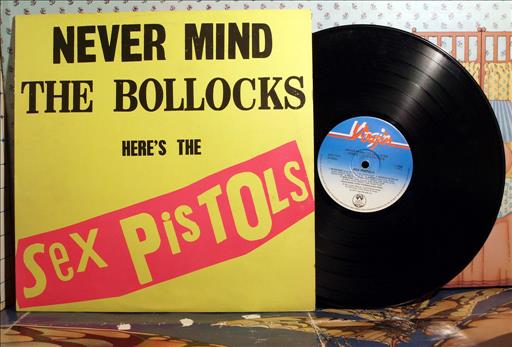
No future: 40 years since Sex Pistols stuck two fingers up at the British establishment
For almost a year, the Sex Pistols had been the focus of sensationalist media coverage. The on Thames Television's tea-time Today programme stoked a moral panic at the end of 1976, precipitating the cancellation of gigs, the band's expulsion from their EMI record deal, and lurid tabloid tales of punk's '.
The release of God Save the Queen in May 1977, issued to and wrapped in a Jamie Reid-designed sleeve that defaced the Queen, further upped the ante. Faux-moral outrage now gave way to faux-patriotic outrage, as the record nevertheless pushed towards the top of the charts. So the story goes, it was only prevented from reaching the number one spot by the .
In its wake, the band's promotional jaunt up the Thames was stopped by police, while Johnny Rotten and Reid were attacked in the street. In punk and the Pistols, the media had found a cultural expression that seemingly embodied the language of crisis and decline that was shaping perceptions of the 1970s. The 'no future' that Rotten warned of at the end of God Save the Queen as he surveyed the 'mad parade' of jubilee pomp amid ongoing fears of economic collapse and social decay, had the air of prophecy.
And yet, just a few months later, the Sex Pistols in the US and punk's cultural form – always a jumble of clashing symbols and contested meanings – would splinter into various subsects.
Shock! Horror! Outrage!Left behind, in the case of the Pistols, were just four singles and an album, before the processes of commodification were revealed and exploited in the post-Pistols packaging of what became '. Looking back, therefore, Never Mind the Bollocks perhaps serves best as a testament: an artefact that affirms the Sex Pistols existence and the cultural ruptures they provoked.
Fittingly, the album inspired a last flurry of controversy. Within the industry, the band's manager, Malcolm McLaren, had sought to goad the Sex Pistols' label, Virgin, by – Spunk – just prior to the release of the 'official' LP. Last-minute wrangling over track listing was also designed to disrupt.
In the media, the album's title, and the inclusion of the track, Bodies, a gurgling bloody depiction of an abortion replete with a volley of expletives from Rotten, was enough to warrant another round of 'four-letter' outrage. Planned radio and TV adverts for the record by the respective media associations.
Within the music press and among punk's affiliates, debate ensued about the album's polished, multi-layered production and the inclusion of all four of the band's previous singles – as if the swindle had already begun as a packaged greatest hits. On the streets, record shop window displays drew attention from police concerned over the word 'bollocks' being shown in public. Threats of prosecution then became real when the manager of Nottingham's Virgin shop was charged under the Indecent Advertisements Act, where the etymology of 'bollocks' as obscene was chewed over and found to be nonsense.
England's dreamingAs an album, Never Mind the Bollocks now finds itself designated a classic; a fixed part of any 'greatest records of all time' list, albeit no longer guaranteed to nestle in the top five. As punk's initial convulsions move further into the past, so the album – and the Sex Pistols – become ever more sanguinely embedded into the cultural fabric. Their shock no longer so acute.
Yet to listen to the album is to still catch glimpse of why punk resonated so widely. Rotten's lyrics to Anarchy in the UK, God Save the Queen and Holidays in the Sun remain vivid snapshots of the 1970s, what as scrambled newscasts evoking terrorism, the Cold War and, most acutely, a prevailing mood of entrenched decay.
The record bristles with exhilarating negation – no feelings, no future – and the pull of abjection. By so doing it captures a sense of how, for some at least, it felt to be young in 1977.
Punk, arguably, was best served by the seven-inch single: short sharp bursts of youthful energy and invective. With Never Mind the Bollocks, however, the Sex Pistols built their own mausoleum – a relic of its time, but whose ghosts still haunt, to put it in another lyric '.

Legal Disclaimer:
MENAFN provides the
information “as is” without warranty of any kind. We do not accept
any responsibility or liability for the accuracy, content, images,
videos, licenses, completeness, legality, or reliability of the information
contained in this article. If you have any complaints or copyright
issues related to this article, kindly contact the provider above.

















Comments
No comment